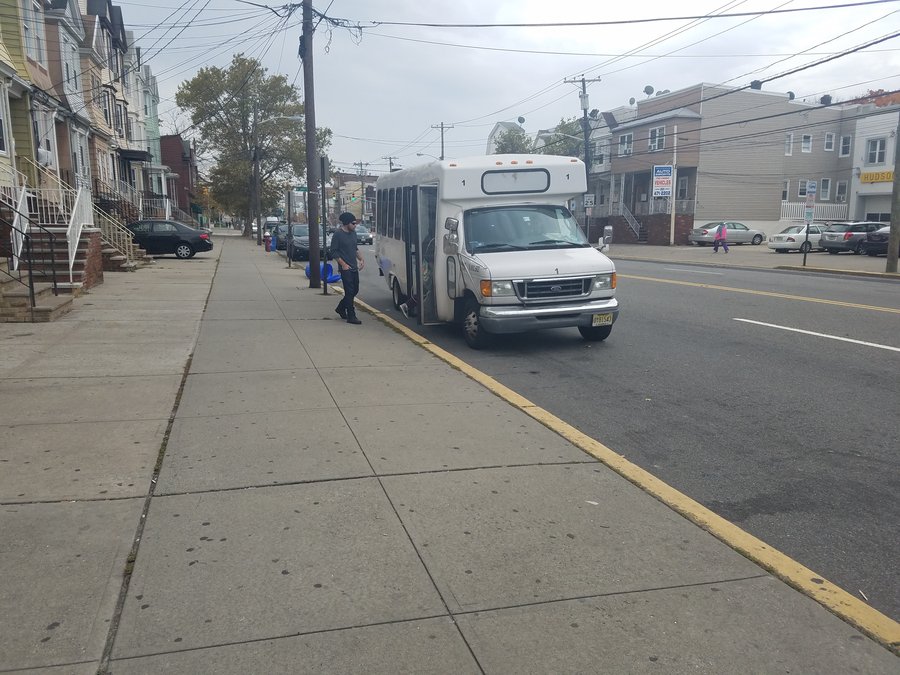A fire that engulfed a jitney bus on Second Street and JFK Boulevard on Saturday, October 29, was likely due to an electrical malfunction, according to the Bayonne Fire Department. The bus was heading southbound on the Boulevard with two passengers onboard when the driver noticed smoke coming from the rear of the bus and pulled over. The two passengers then exited while the driver attempted to extinguish the fire to no avail. The large blaze left nothing but the frame and engine compartment. The source of ignition remains unknown due to the degree of fire damage.
The fire comes a couple of weeks after a jitney bus struck and killed an 11-year-old in Jersey City, prompting a legislative response from 31st District Assemblyman Nicholas Chiavaralloti. He recently introduced a bill to the State Assembly that would further regulate the privately-owned commuter shuttles by requiring the vehicles to be registered with and receive approval from each municipality in which they operate.
Chiavaralloti has heard concerns from council people, the mayor, and a number of residents this year about jitney bus operations. “At the end of the day, we’re not discounting the need or the use of these jitneys,” said Chiavaralloti. “But we need to take reasonable steps to provide for the safety of our residents.”
Chiavaralloti said his bill would allow each municipality to implement its own regulations based on need. “If we require these vehicles to register, the local community will know how many are operating within their city and know what makes sense as to how many should be operating,” Chiavaralloti said. Acknowledging the need for the jitneys, Chiavaralloti said that they should have to obey many of the rules that NJ Transit buses and charter buses do, such as regular maintenance and route scheduling.
The problem
Veronica Gaffor, 18, was waiting on JFK Boulevard for an NJ Transit bus, which she prefers to jitneys, partly because upcoming stops are displayed on a screen inside the bus, but also for comfort. “The way [jitneys] drive, it’s not a smooth ride and it’s kind of creepy,” she said. The main reason she takes the NJ Transit bus, however, is the price. It’s cheaper to ride NJ Transit within one zone, $1.60, compared with $1.75 for the jitney bus, which she said raised their prices when NJ Transit raised theirs.
Up the street, Rowena Rivera said that she feels safer riding NJ Transit because drivers are “more disciplined and follow the rules.” Her daughter, Elizabeth Rivera agreed.
Andy Volpe, a crossing guard on JFK Boulevard, said he supports legislation to further regulate jitneys after observing jitney drivers for years. “They should keep an eye on them more,” he said.“[Drivers] do some things they shouldn’t do like speed and overload the jitney.” Volpe also expressed concern about emission standards for the jitneys.
“We need to take reasonable steps to provide for the safety of our residents.” – Nicholas Chiavaralloti
____________
Market and fair labor
Ray Greeves, chairman of the Amalgamated Transit Union (ATU) , takes issue with the jitney bus companies on labor grounds. “People who are operating those buses are working probably 15-18-hour days and really being taken advantage of,” he said, calling the industry “pretty shady.” According to an independent investigation by the ATU, many jitney bus companies do not operate like regular charter bus companies. Drivers show up to a garage to pay a flat fee to drive the bus for the day, making their profit from cash-only fares. Greeves said this business model incentivizes unsafe driving because it creates competition for fares not only among the jitney bus drivers, but between those drivers and all other buses that share the same bus stops. The result is erratic driving to pick up as many passengers from other buses as possible.
Greeves said other bus companies have union employees who are trained properly, have Commercial DriversLicenses and undergo background checks. “Do the jitney bus companies do background checks on operators? Are they required to follow the safety regulation? No, they’re not,” Greeves said. “And we need to address that.”
Emil Massa, owner of charter bus company, Broadway Bus, said jitney buses are bad for the industry and their business model goes too far against the grain of the rest of the industry. “The point that aggravates me is that you have existing bus companies on these lines,” he said. “If you want to start something, you go and create your own. You shouldn’t have the right to come in when someone has been there for years.”
Massa derided the jitney companies for “not paying a penny to drive on the Boulevard,” like he and other charter bus companies must do. He sees jitney bus companies as undercutting his company and companies like his, partly by skirting the strict maintenance costs required of charter bus companies. He pointed to the fire last week as possible evidence that those buses are not maintained. “When you maintain vehicles the way you’re supposed to, those things shouldn’t happen.”
Rory Pasquariello may be reached at roryp@hudsonreporter.com.
